The Lake Vacations Market is estimated to be valued at USD 288.1 million in 2025 and is projected to reach USD 894.7 million by 2035, registering a compound annual growth rate (CAGR) of 12.0% over the forecast period.
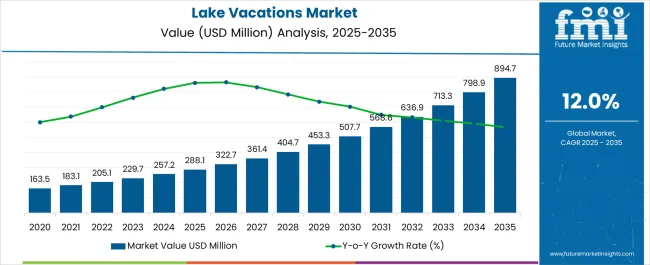
| Metric | Value |
|---|---|
| Lake Vacations Market Estimated Value in (2025 E) | USD 288.1 million |
| Lake Vacations Market Forecast Value in (2035 F) | USD 894.7 million |
| Forecast CAGR (2025 to 2035) | 12.0% |
The lake vacations market is witnessing renewed traction, propelled by the rising consumer preference for nature-centric retreats, increased interest in slow travel, and a growing emphasis on localized, wellness-oriented tourism. Demand for tranquil destinations that offer a combination of scenic views, recreational activities, and minimal crowds has created a favorable environment for lakeside tourism.
In parallel, improvements in road accessibility, digital marketing by local tourism boards, and the expansion of digital booking ecosystems have supported visibility and access to lesser-known lake destinations. Post-pandemic shifts in travel behavior have accelerated the appeal of domestic, short-haul, and drive-to vacation options, with travelers favoring open-air, uncrowded, and immersive lodging experiences.
With sustainability playing a larger role in vacation planning, lakeside properties that blend environmental stewardship with modern comfort are expected to experience continued growth. Looking ahead, demand is likely to be supported by rising disposable incomes, multigenerational travel, and increased integration of wellness, cultural, and eco-activities around lakefront communities.
The market is segmented by Accommodation Type, Booking Channel, Tourist Type, Tour Type, and Consumer Orientation and region. By Accommodation Type, the market is divided into Home, Apartments, and Resorts/ Condominium, others. In terms of Booking Channel, the market is classified into Online Booking, Phone Booking, and In-Person Booking. Based on Tourist Type, the market is segmented into Domestic and International. By Tour Type, the market is divided into Independent Traveller, Tour Group, and Package Traveller. By Consumer Orientation, the market is segmented into Women and Men. Regionally, the market is classified into North America, Latin America, Western Europe, Eastern Europe, Balkan & Baltic Countries, Russia & Belarus, Central Asia, East Asia, South Asia & Pacific, and the Middle East & Africa.
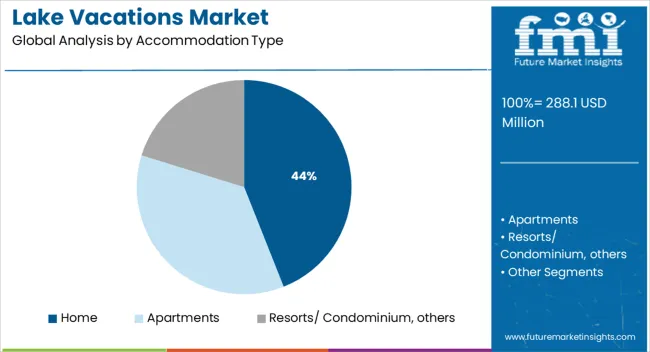
Home accommodations are expected to contribute 44.0% of the total market revenue in the lake vacations segment by 2025, making it the leading accommodation type. This growth is being influenced by the shift toward personalized, private, and flexible lodging options that allow travelers to experience lakeside living in a more intimate setting.
Homes offer extended stay capabilities, access to full kitchens, outdoor spaces, and proximity to local communities—all of which have become increasingly attractive in the context of family travel and remote work. The rise of short-term rental platforms has facilitated widespread availability and discoverability of such properties across major lake destinations.
Travelers are valuing autonomy and self-catering more than ever, leading to increased booking preference for whole-home accommodations over traditional hotel formats. In parallel, homeowners near lakes are monetizing underutilized properties, further expanding supply in this segment.
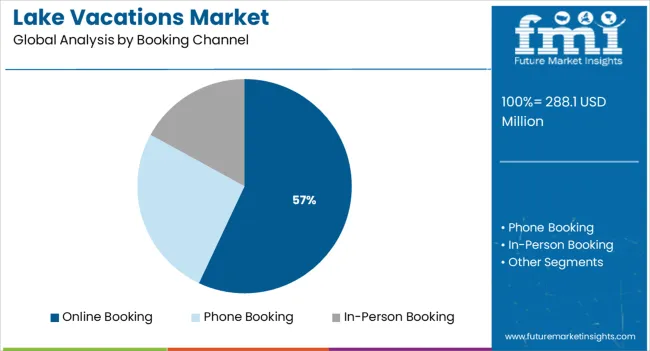
Online booking is projected to dominate with 57.0% of the revenue share in 2025, positioning it as the preferred channel for lake vacation planning. This growth is being driven by the convenience, transparency, and personalization that online platforms offer, particularly for niche and destination-specific travel such as lakeside holidays.
The ability to browse user reviews, compare rates, filter for pet-friendly or waterfront options, and make secure transactions has encouraged travelers to shift decisively toward digital channels. Integration with mapping, itinerary tools, and cancellation flexibility has further boosted consumer trust.
As mobile penetration deepens and user-generated content continues to influence decisions, the role of online booking in driving discoverability and conversion across tier-2 and tier-3 lake destinations is expected to strengthen. Additionally, partnerships between regional tourism boards and booking platforms are making curated lake vacation experiences more accessible and searchable online.
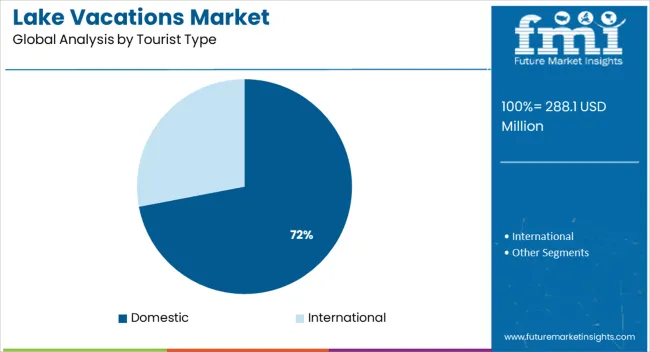
Domestic tourists are expected to lead the lake vacations market with a commanding 72.0% share of total revenue in 2025. This dominance is attributed to several factors including increased regional exploration, rising road trip culture, and consumer focus on nearby, nature-based getaways.
Cost-effectiveness, convenience, and familiarity with regional travel norms have made lake destinations particularly appealing for families, couples, and solo travelers looking for weekend or seasonal escapes. Government tourism campaigns and incentives encouraging domestic travel have also played a significant role in revitalizing interest in inland natural attractions, including lakes.
Furthermore, the flexibility of domestic travel—especially in terms of itinerary, transportation, and travel duration—has resonated strongly with post-pandemic traveler expectations. As infrastructure continues to improve and secondary lake towns become better connected and digitally visible, domestic tourism is expected to retain its dominance in the market.
Spending time in the opulent hotels that are positioned all around the world's most stunning lakes is essentially what a lake vacation entails. On a lake vacation, you can also go fishing, wine or whiskey tasting, boating, cycling, horseback riding, building campfires, and enjoying some good eating.
The Lakes Region offers a wide variety of year-round recreational and cultural activities, from local theatres and museums to skiing and snowmobiling. The overall outlook for the Lake Vacations Market looks bright and positive during the forecast period while creating opportunities for firms, helping local economies, and generating employment opportunities.
Fort George and The Shaw Festival are the top attractions in Niagara-on-the-Lake that are expressly catered to family, youth, and educational markets. Niagara-on-the-Lake is largely a destination for adults seeking leisure. In Niagara-on-the-Lake, there are numerous events and festivals that take place throughout the year. These activities rely heavily on the help of community volunteers to succeed.
Younger guests are drawn there by the wine and food offerings. Meetings, conferences, and business travel are crucial to the year-round success of firms. Although there is a lack of data specifically for Niagara-on-the-Lake, conversations with a variety of tour operators of all sizes and sorts, as well as anecdotal evidence, indicate that the busiest season in recent years has changed from July/August to September/October. Greater Toronto Area (GTA) continues to be a significant market.
The availability of streaming platforms and the internet has led to an increase in the availability of content that appeals to a diverse range of viewers worldwide. Because of this, tourist attractions that host the shooting of such content are particularly well-liked.
The target consumer group's rising disposable income has also contributed to the boom in lake tourism. Another significant driver of market expansion has been the accessibility of lodging options and the low cost of travel. These reasons have increased consumer demand, making the current time the ideal place to enter the market.
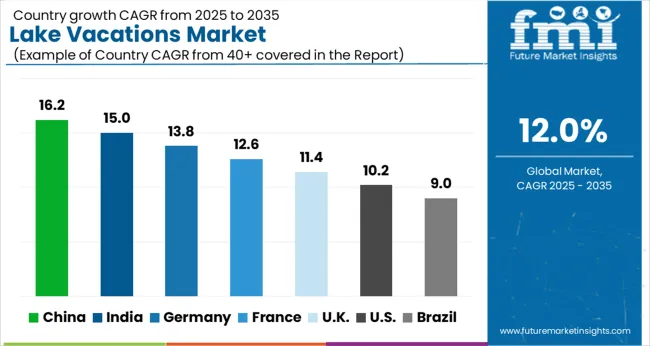
Only Crater Lake gives the prestige of diving in a flooded volcano that also happens to be the deepest lake in the United States. Other lakes include shipwrecks or sunken villages (and the ninth deepest in the world). You won't be able to descend to the very bottom without a deep-sea submersible (1,943 feet).
However, there is a lot to discover in the crystal-clear shallows, including lava formations, fish (such as salmon and trout), and underwater moss meadows. The drawback is that you must carry your own scuba gear 700 feet up and down the Cleetwood Cove Trail. Try the Wizard Island boat cruises around the island in the crater if that's not your idea of a holiday instead.
One of the top five lakes in the Italian Lakes region is Lake Como. It is ringed by mountains and populated with resort communities. People go there to refresh themselves and escape the heat. You can travel across the lake using car ferries and water taxis. The variety of things you can engage in here will ensure that you have a fantastic time.
Due to its location in northern Italy, Lake Como experiences a continental climate. The winters are bitterly cold while the summers are sweltering and muggy. The subtropical plants may grow due to the springtime temperatures, which average approximately 16°C and add to the lake's surrounding flora. In May, there is a one-month wet period.
The trees display a variety of hues in the autumn months of October and November, which is a sight to behold. It rarely snows at Lake Como, although around the end of December or the beginning of January, snowfall is common. Lake Como in Italy has typical Italian weather, making it a year-round tourist destination in Europe.
The purpose of a Lakeside Action and Management Plan (LAMP) is to assess, protect, restore, and maintain the ecological integrity of each Great Lake and the river system that connects it. It organizes the efforts of all the stakeholders - both public and private - working to strengthen the ecosystem of the lake. It is ensured that the LAMP addresses the people's concerns through a public consultation procedure.
The governments of Canada and the USA have agreed to restore and maintain the physical, biological, and chemical integrity of the Great Lakes waters under the terms of the Great Lakes Water Quality Agreement. Binational action plans* for preserving and repairing the Great Lakes ecosystem are known as the Lakeside Action and Management Plans (LAMPs).
Hotels are the most preferred accommodation type in the Lake Vacations Market
The most conventional and popular types of lodging are hotels. Hotels can range in size. They may be privately held companies or be part of a hotel chain. Little areas can have a big design impact if they are used wisely. As tourist preferences change, it is projected that the small hotel will become more well-liked. In order to maintain a balanced lifestyle, many travelers, especially young people, focus on taking several quick journeys as opposed to one lengthy holiday. The craze appeals to a much wider demographic than simply millennials; budget vacationers, hikers, and business travelers are all frequently sighted donning it.
Online booking channels lead the booking channel segmentation
According to the report, when it comes to booking channels, the internet booking sector holds a sizable market share. The number of people using the internet worldwide has increased over the past several years. Data on many industries are readily available to the customer. The service provider also thinks that there is a lot of room for marketing and advertising in the online market, and booking is simple and convenient for customers.
Packaged Traveler is the most prominent category
The Packaged Traveller category has become the most common one in the tour type segmentation as a result of several businesses providing various services and all-inclusive packages. The companies provide cinematic tourism packages with a range of activities, settings, and costs, which helps meet the needs of the majority of the customer base without requiring them to use various channels for various services, saving them time, trouble, and money. Consequently, vacation packages have become the norm in the lake vacation market.
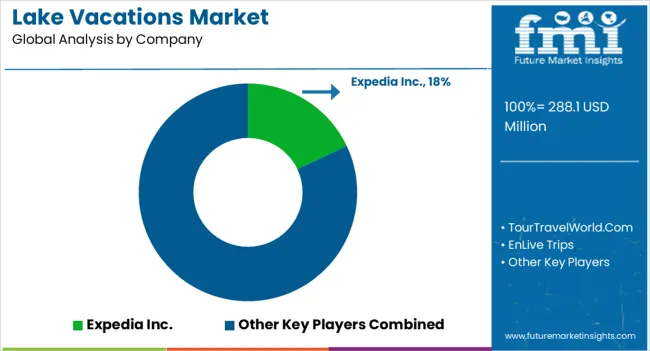
Additionally, hotels near lakes provide relaxing massages, yoga, tai chi, and meditation. Each year, thousands of visitors take advantage of the many services that lake hotels provide, which is fuelling a thriving global lake holiday industry and maintaining the competitive edge in the market by offering all-inclusive packages and saving the tourists from the hassle of going through different channels for their tours. Investments and Government initiatives and are boosting the market and have also helped the firms improve their services.
For Instance:
| Attribute | Details |
|---|---|
| Forecast Period | 2025 to 2035 |
| Historical Data Available for | 2020 to 2024 |
| Market Analysis | USD Billion for Value |
| Key Regions Covered | North America; Latin America; Europe; East Asia; South Asia; Oceania & Middle East; and Africa(MEA). |
| Key Countries Covered | USA, Canada, Brazil, Mexico, Germany, United Kingdom, France, Spain, Italy, Russia, Benelux, South Africa, Northern Africa, GCC Countries, China, Japan, South Korea, India, Thailand, Malaysia, Indonesia, Australia & New Zealand. |
| Key Segments Covered | Accommodation Type, Booking Channel, Tourist Type, Tour Type, Consumer Orientation, Age Group, and Region |
| Key Companies Profiled | TourTravelWorld.Com; Central Holidays; EnLive Trips; Hello Travel; Eastmytrip.com; Expedia, Inc.; Viha Vacations.com; Tripnetra |
| Report Coverage | Market Forecast, Company Share Analysis, Competition Intelligence, Drivers, Restraints, Opportunities and Threats Analysis, Market Dynamics and Challenges, and Strategic Growth Initiatives |
| Customization & Pricing | Available upon Request |
The global lake vacations market is estimated to be valued at USD 288.1 million in 2025.
The market size for the lake vacations market is projected to reach USD 894.7 million by 2035.
The lake vacations market is expected to grow at a 12.0% CAGR between 2025 and 2035.
The key product types in lake vacations market are home, apartments and resorts/ condominium, others.
In terms of booking channel, online booking segment to command 57.0% share in the lake vacations market in 2025.






Our Research Products

The "Full Research Suite" delivers actionable market intel, deep dives on markets or technologies, so clients act faster, cut risk, and unlock growth.

The Leaderboard benchmarks and ranks top vendors, classifying them as Established Leaders, Leading Challengers, or Disruptors & Challengers.

Locates where complements amplify value and substitutes erode it, forecasting net impact by horizon

We deliver granular, decision-grade intel: market sizing, 5-year forecasts, pricing, adoption, usage, revenue, and operational KPIs—plus competitor tracking, regulation, and value chains—across 60 countries broadly.

Spot the shifts before they hit your P&L. We track inflection points, adoption curves, pricing moves, and ecosystem plays to show where demand is heading, why it is changing, and what to do next across high-growth markets and disruptive tech

Real-time reads of user behavior. We track shifting priorities, perceptions of today’s and next-gen services, and provider experience, then pace how fast tech moves from trial to adoption, blending buyer, consumer, and channel inputs with social signals (#WhySwitch, #UX).

Partner with our analyst team to build a custom report designed around your business priorities. From analysing market trends to assessing competitors or crafting bespoke datasets, we tailor insights to your needs.
Supplier Intelligence
Discovery & Profiling
Capacity & Footprint
Performance & Risk
Compliance & Governance
Commercial Readiness
Who Supplies Whom
Scorecards & Shortlists
Playbooks & Docs
Category Intelligence
Definition & Scope
Demand & Use Cases
Cost Drivers
Market Structure
Supply Chain Map
Trade & Policy
Operating Norms
Deliverables
Buyer Intelligence
Account Basics
Spend & Scope
Procurement Model
Vendor Requirements
Terms & Policies
Entry Strategy
Pain Points & Triggers
Outputs
Pricing Analysis
Benchmarks
Trends
Should-Cost
Indexation
Landed Cost
Commercial Terms
Deliverables
Brand Analysis
Positioning & Value Prop
Share & Presence
Customer Evidence
Go-to-Market
Digital & Reputation
Compliance & Trust
KPIs & Gaps
Outputs
Full Research Suite comprises of:
Market outlook & trends analysis
Interviews & case studies
Strategic recommendations
Vendor profiles & capabilities analysis
5-year forecasts
8 regions and 60+ country-level data splits
Market segment data splits
12 months of continuous data updates
DELIVERED AS:
PDF EXCEL ONLINE
Flakes Making Machine Market Size and Share Forecast Outlook 2025 to 2035
Flake Ice Machines Market - Industry Growth & Market Demand 2025 to 2035
Flake Graphite Market
Flaked Shortening Market
Deflaker Market Growth – Trends & Forecast 2024-2034
Data Lake Market Size and Share Forecast Outlook 2025 to 2035
Data Lakehouse Market Size and Share Forecast Outlook 2025 to 2035
Pea Flakes Market Size and Share Forecast Outlook 2025 to 2035
Market Share Breakdown of Pea Flakes Manufacturers
Yeast Flakes Market
Potato Flakes Market Analysis - Size, Share, and Forecast Outlook 2025 to 2035
Barley Flake Market Size and Share Forecast Outlook 2025 to 2035
Banana Flakes Market Size and Share Forecast Outlook 2025 to 2035
Market Leaders & Share in the Potato Flakes Industry
Competitive Landscape of Edible Flakes Providers
Cereal Flake Market
FD and C Lakes Market Size, Growth, and Forecast for 2025 to 2035
UK Potato Flakes Market Report – Growth, Demand & Forecast 2025-2035
USA Potato Flakes Market Growth – Innovations, Trends & Forecast 2025-2035
ASEAN Potato Flakes Market Report – Growth, Demand & Forecast 2025-2035

Thank you!
You will receive an email from our Business Development Manager. Please be sure to check your SPAM/JUNK folder too.
Chat With
MaRIA